|
|
|
Sort Order |
|
|
|
Items / Page
|
|
|
|
|
|
|
| Srl | Item |
| 1 |
ID:
126327
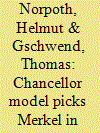

|
|
|
|
|
| Publication |
2013.
|
| Summary/Abstract |
In the German national election this fall, based on the forecast of the Chancellor Model, the governing coalition will score a resounding victory. Chancellor Angela Merkel enjoys a high approval rating, which puts her at a 2-1 advantage over the challenger, Peer Steinbrück. Although Germany is not a presidential system, where voters elect the chief policymaker, chancellor support has proved to be a strong predictor of vote choice in German national elections. Our forecast model also includes long-term partisanship, which provides a broad base for the governing parties in this election, and length of tenure, which exacts a modest penalty after two terms of office. Since its premiere in 2002, the model has predicted the winner in each election. In a case of perhaps beginner's luck, the 2002 forecast scored a bull's-eye with 47.1%, the exact share of the governing parties; the forecast was posted three months before Election Day. No poll or other model, not even the Election-Day exit polls, came close to this performance; in fact, most people predicted a defeat for Schröder's red-green coalition (Norpoth and Gschwend 2003).
|
|
|
|
|
|
|
|
|
|
|
|
|
|
|
|
| 2 |
ID:
126331
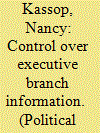

|
|
|
|
|
| Publication |
2013.
|
| Summary/Abstract |
You may be forgiven if you associate Lou Fisher's name primarily with his robust defense of Congress's preeminent authority in national security and budgetary matters, or with the idea that courts are only one of three co-equal players in the constitutional dialogue that occurs among all of the branches, or with the related effort to disabuse scholars, the press, and the public of the profoundly incorrect notion that courts have "the last word" in constitutional interpretation. All of these themes are, indeed, key components of Fisher's vast body of scholarly work and public testimony, and they will be forever linked to him as their progenitor. Just as solidly grounded in impeccable research and unassailable logic is Fisher's work on executive power. It fits snugly within his Madisonian emphasis on a government of limited and shared powers, enforced through effective checks and balances, where each institution exercises its respective power while overseeing the other branches to ensure respect for constitutional boundaries.
|
|
|
|
|
|
|
|
|
|
|
|
|
|
|
|
| 3 |
ID:
126344
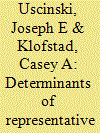

|
|
|
|
|
| Publication |
2013.
|
| Summary/Abstract |
In May 2012, political scientists learned of efforts by representative Jeff Flake (R-AZ) to eliminate political science funding from the National Science Foundation (NSF) budget. The American Political Science Association (APSA) was caught off-guard, and concerned political scientists scrambled to contact their representatives and urge the amendment's defeat. Flake's initial effort to cut funds overall from the NSF was defeated, but a second measure, specifically to keep the NSF from funding political science, passed only hours later. This was the second time in three years that legislators targeted the NSF Political Science Program. Although these measures have been sponsored and widely supported by Republicans, some Democrats have supported these measures as well. This article examines the vote on the Flake Amendment to understand why individual representatives voted for or against cutting NSF funding for political science research.
|
|
|
|
|
|
|
|
|
|
|
|
|
|
|
|
| 4 |
ID:
126348
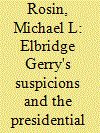

|
|
|
|
|
| Publication |
2013.
|
| Summary/Abstract |
Defenders of the Electoral College frequently assert that victory in the Electoral College requires a winning candidate to "produce a coalition of states with wide and diverse interests" thereby producing "a broadly based electoral victory." These defenders never stop to consider the fact that in a close election the difference between the winning and losing coalition of states may depend on highly contingent factors. In a 2003 article in this journal Neubauer and Zeitlin demonstrated that George W. Bush's Electoral College victory in 2000 depended on the size of the House of Representatives. In this article I demonstrate that the outcome of the 2012 election could have depended on the 2012 Electoral College being based on the newly apportioned incoming House rather than the previously apportioned outgoing House. This is a statutory specification rather than a constitutional requirement. It could be changed by simple legislation. We have Elbridge Gerry's suspicions to thank for this statutory contingency!
|
|
|
|
|
|
|
|
|
|
|
|
|
|
|
|
| 5 |
ID:
126354
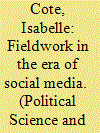

|
|
|
|
|
| Publication |
2013.
|
| Summary/Abstract |
Social networking sites have recently garnered academic attention for their role in fostering democracy and openness in both developed and developing regions. Unfortunately, in political science, this newfound interest has not yet translated into a greater interest in social media as a methodological tool for researchers conducting fieldwork. How has the era of social media influenced the way political scientists conduct their fieldwork? How can researchers make the most of the opportunities offered by social networking sites while abiding by the strict standards of their ethics board? This article highlights the potential in social networking sites for recruiting participants and gathering data and looks at the impact sites such as Facebook have had on building and maintaining trust with research participants. In contrast, it explores how social media may compromise one's ability to uphold the "do no harm" principle guiding all academic research by jeopardizing participants' confidentiality and anonymity, a risk deemed especially high for vulnerable populations or sensitive regions. Insight gleaned from the researcher's own fieldwork in two minority provinces of Indonesia in 2010-2011 is used as a case in point.
|
|
|
|
|
|
|
|
|
|
|
|
|
|
|
|
| 6 |
ID:
126346


|
|
|
|
|
| Publication |
2013.
|
| Summary/Abstract |
Movies continue to be the most accessible art form to Americans and that reach allows films to have a tremendous effect on moviegoers. With more than a billion movie tickets sold annually in the United States, the ability of movies to influence the perceptions of moviegoers is pronounced. Frequently, the government is part of those depictions. Although film is routinely studied in a host of disciplines, a focus on the portrayal of government generally and government officials more specifically, remains elusive. Instead of using a case-study approach, we examine recent, popular films to investigate how government is portrayed generally and how individual governmental characters are depicted. For our sample, we use the top-10 box office grossing films from 2000 to 2009 to assess how government is depicted in the films most likely seen by the majority of movie-watching Americans. Perhaps unsurprisingly, we found that films generally have a mixed view of government with more negative depictions than positive. However, in examining bureaucrats, police officers, soldiers, and politicians, we found a much more positive depiction of these individual government characters. Americans may view government negatively, but in film they see positive depictions of individual civil servants.
|
|
|
|
|
|
|
|
|
|
|
|
|
|
|
|
| 7 |
ID:
126339
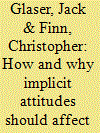

|
|
|
|
|
| Publication |
2013.
|
| Summary/Abstract |
This article provides a foundation for understanding the role of implicit biases in political behavior, particularly implicit racial attitudes and voting behavior. Although racial attitudes have rarely played a major direct role in American presidential politics until 2008, numerous local, state, and federal elections are held every year in the United States that involve minority candidates. As a result, the implications are considerable.
|
|
|
|
|
|
|
|
|
|
|
|
|
|
|
|
| 8 |
ID:
126355


|
|
|
|
|
| Publication |
2013.
|
| Summary/Abstract |
We marshal discoveries about human behavior and learning from social science research and show how these can be used to improve teaching and learning. The discoveries are easily stated as three social science generalizations: (1) social connections motivate, (2) teaching teaches the teacher, and (3) instant feedback improves learning. We show how to apply these generalizations via innovations in modern information technology inside, outside, and across university classrooms. We also give concrete examples of these ideas from innovations we have experimented with in our own teaching.
|
|
|
|
|
|
|
|
|
|
|
|
|
|
|
|
| 9 |
ID:
126338
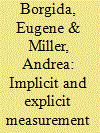

|
|
|
|
|
| Publication |
2013.
|
| Summary/Abstract |
In 2011, more than 3% of all black men in the United States were imprisoned, compared to only 0.5% of all white men. Among prisoners ages 18 to 24, black men were imprisoned at a rate more than seven times that of white men (Carson and Sabol 2012). It is becoming increasingly urgent for researchers to understand what accounts for these race-based disparities. While a broad constellation of social problems exist that likely contribute to these disparities in concert, different fields of social science tend to focus on different types of explanations. Political scientists and sociologists have tended to emphasize the role of institutional factors, including criminal justice policies and practices, in maintaining race-based disparities. Social psychologists, in contrast, have tended to emphasize individual factors, including punitive responses to crime by jurors, judges, and criminal justice professionals.
|
|
|
|
|
|
|
|
|
|
|
|
|
|
|
|
| 10 |
ID:
126340
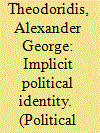

|
|
|
|
|
| Publication |
2013.
|
| Summary/Abstract |
It is easy enough to rattle off numerous categories of social identities long of interest to political behavior scholars-race, sex, state or nation, party, ideology, social class, etc. But, a precise definition and measurement strategy for examining these identities is more elusive. This article discusses the conceptual foundations of a recently developed approach to measuring identity and focuses on its specific application as a new measure of partisanship in the United States.
|
|
|
|
|
|
|
|
|
|
|
|
|
|
|
|
| 11 |
ID:
126342


|
|
|
|
|
| Publication |
2013.
|
| Summary/Abstract |
Political knowledge today is studied primarily at the explicit level. Measures of political knowledge often rely on testing whether voters are aware of various "facts" about political life, such as the names and offices of prominent political actors, the institutional structures of the political system, and the ideological or policy differences between the major political parties (e.g., Delli Carpini and Keeter 1996). These various kinds of political information are considered to be important by political scientists and other social scientists because they facilitate the informed voting decisions that are needed to hold elected leaders accountable (e.g., Lau and Redlawsk 2006; Pande 2011).
|
|
|
|
|
|
|
|
|
|
|
|
|
|
|
|
| 12 |
ID:
126341
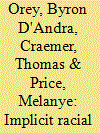

|
|
|
|
|
| Publication |
2013.
|
| Summary/Abstract |
One of the shortcomings of the implicit racial attitudes literature is that it relies almost exclusively on white subjects. Arguably, there are two possible reasons for this. First, these measures were created to address issues of social desirability among whites who harbor negative racial attitudes toward blacks. Second, social desirability pressures and antiblack affect were not viewed as significant among black respondents (see Craemer 2008). This assumption is problematic because it treats black racial attitudes as a monolith. Rather than examining black racial opinion as a complicated and multivalenced set of evaluations about their own group and others, there has been an over emphasis on measures of group solidarity (e.g., linked fate). Understandably, bloc voting and cohesive policy opinions have partially justified this focus; however, the black community is more diverse than presidential election turnout suggests. Price (2009) argues that linked fate, the most common measure for black racial identity, is not adequately problematized as a potentially positive or negative measure of psychological attachment. Here, we hope to build on this literature by using an implicit black identity measure.
|
|
|
|
|
|
|
|
|
|
|
|
|
|
|
|
| 13 |
ID:
126337
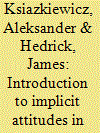

|
|
|
|
|
| Publication |
2013.
|
| Summary/Abstract |
During the past two decades, mounting evidence suggests that much of human social cognition occurs without deliberate effort and largely outside conscious awareness. Dual-process models, which distinguish explicit (conscious, slow, effortful) cognitive processes from implicit (often unconscious, fast, effortless) cognitive processes, "form the dominant paradigm [of social cognition research] for the past 20 years or more" (Evans 2008). Although these advances in social cognition research have begun to be integrated into models of political cognition over the past decade (e.g., Kim, Taber, and Lodge 2010; Lodge and Taber 2013; see Nosek, Graham, and Hawkins 2010 for a review), and are beginning to influence other disciplines like communication (see Hefner et al. 2011), the role of implicit processes in outcomes commonly studied by political scientists deserves more attention. This symposium aims to showcase the diverse set of subject areas within political science to which dual-process models have been and can be applied. We hope that this symposium is a springboard for those who are considering bringing a dual-process approach into their own research by providing an overview of relevant literatures and methods.
|
|
|
|
|
|
|
|
|
|
|
|
|
|
|
|
| 14 |
ID:
126349
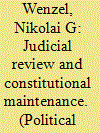

|
|
|
|
|
| Publication |
2013.
|
| Summary/Abstract |
Constitutional restraints on government are tricky and evanescent; government failure (a lapse into anarchy or leviathan) has historically been the norm, and constitutional success an infrequent exception. To shed light on constitutional maintenance, this article examines the concept of constitutional review by studying three competing systems: the American/Marshall system of judicial review; the Commonwealth/Westminster model of parliamentary sovereignty; and the Kelsen compromise between the two. Each system's strengths and weaknesses are assessed, as constitutional framers navigate the treacherous waters between the Scylla of parliamentary tyranny and Charybdis of gouvernement des juges. In the end, neither extreme is perfect, but lessons are drawn from each of the three models.
|
|
|
|
|
|
|
|
|
|
|
|
|
|
|
|
| 15 |
ID:
126328
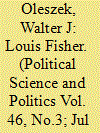

|
|
|
|
|
| Publication |
2013.
|
| Summary/Abstract |
During the 1950s, Isaiah Berlin wrote a famous essay entitled "The Hedgehog and the Fox." The point behind the title is that the hedgehog knows one big thing and the fox knows many things. From this distinction, Berlin suggests there are two intellectual types: one who relates everything to a single idea and the other who explores a diversity of ideas. It is difficult and unrealistic to pigeonhole Fisher as one or the other intellectual type. The reality is that Fisher combines both types. My sense is that Fisher's wide diversity of scholarly and policy-influencing accomplishments, and his skepticism of conventional wisdom, put him in Berlin's second category rather than first. However, my position at the Congressional Research Service (CRS) also prompts me to say, on the other hand, one big idea has animated Fisher's contributions to the academic and political/legislative worlds. That idea is highlighted in the title of one of his plethora of publications: Defending Congress and the Constitution (2011). Of course, when you write about the Congress and the Constitution, you analyze-like Berlin's fox-a host of interrelated ideas and relationships: history, law, the presidency, the judiciary, and more.
|
|
|
|
|
|
|
|
|
|
|
|
|
|
|
|
| 16 |
ID:
126329


|
|
|
|
|
| Publication |
2013.
|
| Summary/Abstract |
A dozen years before this PS symposium, several political scientists came together in a similar manner to honor Louis Fisher's scholarship and highlight his contributions to the discipline (Spitzer 2000). Many wonderful insights and observations were made to shed light on Fisher's versatility and impact. However, that effort missed an opportunity to highlight a key contribution of Fisher's work: a revival of pre-behavioral era functions and concerns within political science. In many ways Fisher is a throwback to a traditional political science approach where scholars did not select subfields or specialties but sought to engage in broad public debates about governing and, most importantly, believed that normative and empirical studies could and should go hand in hand. With the latter approach Fisher has made his most important contribution to political science.
|
|
|
|
|
|
|
|
|
|
|
|
|
|
|
|
| 17 |
ID:
126334


|
|
|
|
|
| Publication |
2013.
|
| Summary/Abstract |
The serial fiscal policy and budgeting woes of the United States over the last three decades have been compounded by a bipartisan evasion of institutional responsibility by elected leaders. Long before "sequestration" and "fiscal cliffs," Louis Fisher argued that presidents and members of the House and Senate undermined constitutional power balance and the spirit of budgeting law. A variety of ill-conceived process "reforms" further damaged the separation of powers system. As a scholar, Fisher uses an institutional lens to explore budget concepts that are rare in political science, such as capacity, accountability, and duty. And as a public intellectual, Fisher's relevance has been secured by his repeatedly broaching these scholarly and political taboos.
|
|
|
|
|
|
|
|
|
|
|
|
|
|
|
|
| 18 |
ID:
126332
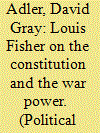

|
|
|
|
|
| Publication |
2013.
|
| Summary/Abstract |
Lou Fisher's prolific writings on the war power-the constitutional repository of authority to initiate war and lesser military hostilities on behalf of the American people-have informed and, for the better part of four decades, shaped discussions and debates on the respective roles of Congress and the president, from the halls of academe to the corridors of power. Widely cited and invoked on hundreds of occasions by political scientists, historians, and legal academics, his work has opened doors for serious consideration of his views by representatives in all three branches of the federal government. It has, as well, established his place in the front-rank of constitutional scholars and, almost certainly, earned for his scholarship an enduring influence on discussions about the constitutional authority to order the use of military force.
|
|
|
|
|
|
|
|
|
|
|
|
|
|
|
|
| 19 |
ID:
126357


|
|
|
|
|
| Publication |
2013.
|
| Summary/Abstract |
Although today's undergraduates may not have considered the implications of class struggle, they are generally well-versed in the intricacies of vampire lore. This article outlines how the vampire metaphor can serve as a valuable pedagogical tool for introducing students to fundamental concepts in Marxist thought. As opposed to the supernatural vampires featured in Stoker's Dracula or Meyer's Twilight saga, this approach treats capitalism as a form of economic vampirism-with the capitalist taking on the role of the vampire and the worker relegated to its prey. The article further extends the vampire metaphor and demonstrates how it can be used to teach the Marxist perspectives on class conflict, alienation, and false consciousness.
|
|
|
|
|
|
|
|
|
|
|
|
|
|
|
|
| 20 |
ID:
126345
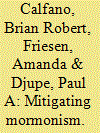

|
|
|
|
|
| Publication |
2013.
|
| Summary/Abstract |
A persistent challenge for minority candidates is mitigating negative effects attributed to their unpopular group identity. This was precisely the case for Mitt Romney, a Mormon, as he sought and captured the 2012 Republican presidential nomination. We draw on existing public opinion data about the tepid reaction to Romney's Mormonism from within Republican ranks. Then, we review our own experimental data to examine a potential mitigation strategy, "God Talk," and its emotional costs to the GOP. We find that Romney and similar candidates may avoid direct penalty by party rank-and-file for their minority attributes when using God Talk, but the associated affective response supporters direct at their party may carry yet-unknown putative costs for both party and candidate.
|
|
|
|
|
|
|
|
|
|
|
|
|
|
|
|
|
|
|
|
|